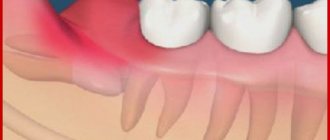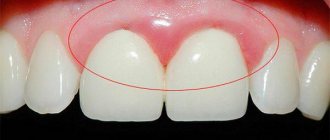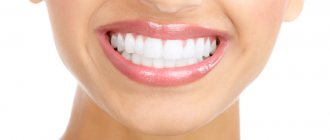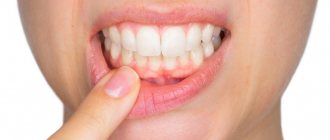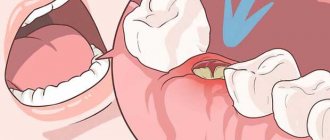The tooth hurts badly. Each of us has had to deal with this unpleasant situation more than once or twice. Many regular patients of the dental clinic already independently differentiate pain due to caries from pain due to pulpitis.
If pain occurs spontaneously, intensely, and worsens at night, they will rush to the dentist the next morning, and if pain arises from external irritants and indicates the development of deep caries, they will allow themselves to postpone treatment for a couple of days. But what to do when all your teeth hurt at once? First, let's figure out why we feel toothache in the first place.
Aching teeth: causes of pathology
When a patient comes to see a dentist and asks why his teeth are hurting for no reason, every good doctor will answer that this does not happen. There are always reasons. Any dental problem has its roots, and aching pain in the teeth is no exception. Another point is that the causes of this symptom are quite extensive and can be associated with a number of characteristics of the body and disturbances in the functioning of its systems. Experts identify more than a dozen factors that can cause aching pain in the teeth.
- Congenital hyperesthesia.
Increased sensitivity of enamel can be inherited, which is why a person may experience discomfort when exposed to temperature and chemicals. - Chips, cracks and other damage to the enamel.
Tooth injuries lead to dentin exposure and also facilitate the penetration of pathogenic microorganisms. - Thinning and weakening of enamel.
This can happen for several reasons. First of all, due to a lack of vitamins and minerals. The second common reason is weakening of the enamel as a result of frequent whitening procedures. - Caries and its complications.
Typically, aching pain in the teeth occurs in the middle stages of the disease. - Periodontal diseases in the active stage.
With periodontitis and periodontal disease, the necks of the teeth are exposed, which makes them (and surrounding tissues) very sensitive to irritants. The same applies to the wedge-shaped defect. - Infectious diseases,
especially chronic ones. Influenza, sinusitis, sinusitis - these diseases can sometimes provoke aching pain in the teeth and jaw. - Problems with the gastrointestinal tract.
- Stress, fatigue, lack of sleep.
- Hormonal disbalance.
Often, aching pain in the teeth occurs during pregnancy. - Inflammation of the trigeminal nerve,
when the pain “radiates” to the teeth. - Allergic reaction
to medications.
Associated symptoms
Not only pain syndrome can indicate the development of diseases of teeth and gums. Warning signs are also:
- bad breath,
- bleeding gums,
- swelling of the cheek or lip,
- redness and swelling of the gums,
- mobility of teeth,
- local temperature increase.
Have you noticed several of the listed signs at once? Make an appointment with a dentist. An experienced doctor will help eliminate the problem and maintain dental health.
Diagnosis of pathology
For any manifestations of pain and discomfort, you should contact a specialist as soon as possible. Only a qualified doctor can correctly diagnose and identify the exact cause of the problem. If a patient comes with a complaint of aching pain in the teeth, a number of standard diagnostic procedures are first performed:
- visual examination of the oral cavity using a probe;
- tracking reactions to temperature stimuli;
- X-ray examination, which can reveal the presence of hidden problems and complications (granulomas, cysts, etc.).
If the pain and aches in the teeth are not directly related to dentistry, the attending physician refers the patient to other specialists. Most often this is a neurologist and maxillofacial surgeon. The localization of pain also helps to determine the root cause.
- Local.
Aching pain covers one or more teeth. This is usually associated with injuries and dental diseases. In some cases, this is a consequence of infectious diseases. - Generalized.
The entire dentition “aches.” The reasons why all teeth ache are usually associated with pathologies and diseases of the enamel.
The teeth of the lower jaw often ache more (especially the front incisors). In many people, they react more strongly to temperature changes, chemical irritants and inflammation of the trigeminal nerve, when pain responds in the anterior part of the lower jaw. On the other hand, the answer to the question why the lower teeth ache is exactly the same as in the case of the upper teeth: there are no separate reasons.
Why do my jaws and all my teeth hurt?
In addition to caries, there are a number of purely dental causes.
- When teeth with sensitive enamel are exposed to hot and cold, spicy and sour, discomfort may appear in the entire jaw.
- It is often difficult to identify the source of pain in pulpitis (inflammation of the neurovascular bundle) or periodontitis (a complication of pulpitis).
- Treatment of dental cysts also provides relief from pain in the entire dentition. With purulent inflammation of a long-formed cyst, pain without clear localization may occur.
- An erupting wisdom tooth, especially one that is incorrectly located in the jaw, also brings significant discomfort. When the eighth molar touches the nerve endings of neighboring teeth, the pain along the chain not only spreads throughout the jaw, but also radiates to the ears and temples.
- When your jaw hurts after tooth extraction, you need to urgently consult a dentist. Such pain usually indicates the development of a complication.
An orthodontic patient who had braces installed a few hours ago also experiences general discomfort. But he must be warned in advance about the appearance of unpleasant sensations.
How to treat aching pain in teeth?
A treatment plan is drawn up after the diagnostic results, when the cause of the pathology is identified and pain is localized. Conventionally, several techniques can be distinguished that are used depending on the factors contributing to the occurrence of pain.
- Therapeutic treatment. It is prescribed when the main cause of aching pain is caries or periodontal disease. In case of caries, filling or endodontic treatment is carried out (if bacteria have penetrated the pulp). In case of periodontal inflammation, special ointments and antiseptics are prescribed, curettage is performed, and in severe cases, teeth are splinted.
- Prosthetics. In the presence of a wedge-shaped defect and serious damage, dental prosthetics are performed with single crowns or bridges. In case of enamel pathologies, the doctor may recommend veneers, which are installed to achieve a certain aesthetics.
- Restoration and strengthening of enamel. What to do if all your teeth ache? If the patient has weakened and thinned enamel, it is necessary to strengthen it. First of all, the doctor treats the enamel surface with special compounds based on calcium and phosphorus, and also prescribes a special diet and means that strengthen the immune system and the health of the body.
To eliminate pain, painkillers (Nurofen, Nimesil and others) can be prescribed. If the aching pain is not associated with dental problems, treatment is carried out by doctors of relevant specializations.
Ways to eliminate pain
You need to visit a dentist as soon as possible to identify the specific cause of the discomfort. Self-medication will not be successful; such actions can only lead to the development of complications. At home, you can only reduce pain for a short time in order to wait for a trip to a specialist:
- Painkillers. They will help reduce the manifestation of pain, regardless of what caused the symptom. You can take Nise or Ketarol according to the instructions. If there is nothing suitable, a Paracetamol tablet will do.
- Infusion of chamomile. Pour boiling water over a tablespoon of dry raw materials. When the liquid has cooled, rinse your mouth.
- Soda + salt. Dissolve a teaspoon of salt + baking soda in a glass of warm water. You need to rinse your teeth every two hours.
Prevention of aching teeth
The best way to prevent an unpleasant symptom is to follow preventive measures. Despite the fact that the enamel itself is very strong, improper lifestyle and exposure to the external environment gradually weaken and destroy it. If you have sensitive enamel, you need to carefully choose hygiene products. In particular, it is recommended to avoid hard toothbrushes and use toothpastes with calcium and fluoride. An equally important point is the right diet. It is necessary to reduce the consumption of spicy, sour and sweet foods to a minimum, and give preference to fermented milk products and foods high in vitamins A and B. Temperature changes are a big stress for sensitive enamel, so the best solution is to drink drinks at room temperature.
Publisher: Expert magazine about dentistry Startsmile.ru
Author of the material: Yaroslav Ikonnikov
Preventive actions
To reduce the risk of dental diseases, you should follow these rules:
- Brush your teeth twice a day.
- Visit the dentist twice a year.
- Preventative professional cleaning of units once a year.
- Avoiding foods that are too hot or cold.
- Carry out enamel whitening only in trusted dental centers.
- Treat your teeth in a timely manner.
- Be more attentive to your health and avoid complications such as otitis media.
- Get rid of bad habits.
- Choose a paste without abrasive particles.
- Additionally, use an antibacterial mouthwash, dental floss and irrigator.
Treatment
Conservative therapy
Pain syndrome is relieved with analgesics. The treatment plan is drawn up taking into account the cause of the symptom. The following methods are used:
- Dental diseases
. For alveolitis, wash the hole with hydrogen peroxide or nitrofural, apply applications with anesthetics and analgesics. For pulpitis and periodontitis, the tooth cavity is treated and disinfected, regenerating and anti-inflammatory pastes are used, pain is eliminated with analgesics, and antibiotics and sulfonamides are prescribed to combat inflammation. - Traumatic injuries
. A conservative method of treating fractures of the upper jaw is the application of dental splints connected to a horseshoe-shaped bracket in the forehead area. To immobilize the alveolar process, a splint-bracket made of aluminum wire is used, fixed to the teeth using a light-curing composite and adhesive material or metal ligatures, if necessary, in combination with a chin sling. - Purulent processes and ENT pathologies
. Patients are prescribed broad-spectrum antibiotics; after a bacteriological examination, the drug is replaced taking into account sensitivity. Additionally, immunocorrectors, detoxifying, anti-inflammatory, and antihistamines are used. Local treatment includes rinsing and dressings. - Ganglionitis of the pterygopalatine ganglion
. To reduce pain, the nasal cavity is lubricated with dicaine, and turundas with novocaine are administered. In severe cases, ganglion blockers and ganglion blockades with anesthetics are recommended. Local administration of hydrocortisone is effective. Medicines with antiallergic and restorative effects are indicated.
Physiological processes
The most common factors that cause pain at night are physiological. Most often, this phenomenon is caused by a horizontal position taken during rest. In this position, blood flows intensely to the head, brain and jaws, which increases pressure on the inflamed tissues and nerve endings of the teeth. It should be noted that this process is not typical for all dental diseases. The most common cause of acute and severe toothache at night is pulpitis. At this time of day, excessive pressure forms in the inflamed pulp due to increased blood flow, and bundles of nerve fibers begin to send active signals to the central nervous system. Excruciating pain, mainly at night, can also occur with periodontitis and periodontitis.
Physiological factors
A separate group of reasons why patients experience toothache at night includes physiological factors:
- The time interval is from 00 o'clock to 5 am. This period of time is the most stressful and difficult for the entire human body. It is at this time that pain intensifies and sensitivity to any lesions and diseases, including dental ones, increases.
- Physiologists say that at night the vagus nerve called the vagus is activated, which has a large number of branches, some of which extend to the head area. The vagus affects the general condition and mood of a person. At night, the tone of the vagus nerve changes, which leads to increased sensitivity and pain.
- Also, based on the characteristics of the biorhythm, at night, even in a healthy person, blood pressure increases significantly. High blood pressure increases toothache.
Dead tooth hurts
After the nerve is removed, the tooth may respond for some time with mild pain to pressure or biting, including at night. This is a normal reaction. In these cases, it is enough to take a painkiller tablet.
If the pain becomes twitching and intensifies, it means that the nerve was not completely removed or the doctor made mistakes related to cleaning the canals or installing a filling. The biggest problem is that neither pills nor folk remedies will help. Start looking for a doctor right away.
Wisdom tooth hurts
A special unit in our body is the wisdom tooth. It usually erupts at the age of 18-25 years, and severe pain may occur. The molar breaks through the bone and gum tissue, essentially tearing it apart. At night, the pain may intensify; it can be relieved with the help of pain-relieving gels (Cholisal, Metrogyl Denta, Asepta) or analgesics.
It’s good if the tooth runs vertically and has enough space in the gum. A much worse option is when the molar breaks through at an angle or even horizontally. The “figure eight” puts pressure on the roots of neighboring teeth and displaces them. In addition to pain, swelling of the gums and cheeks may appear, as well as an increase in body temperature. As a temporary option, you can take painkillers, but the problem will have to be resolved with a surgeon. As always, the sooner the better.
A wisdom tooth can simply hurt due to caries, pulpitis, periodontitis, or cysts. Another reason is inflammation of the so-called hood, a fold on the gum that forms when teeth erupt. The cause of pericoronitis is the accumulation of food particles, which gradually begin to rot, accompanied by pain in the “eight” area. In the most severe situations, pus begins to secrete.
To relieve pain, you can rinse your mouth with warm infusions of herbs (sage, chamomile), use a gel and take a pain reliever. And in the morning - to the doctor.
Important.
A wisdom tooth is also a tooth. But, if it interferes with the normal position of the teeth, causes crowding, or if the dentin is deeply damaged, dentists recommend removing it.
When you can't put off visiting a doctor
Night pain is dangerous because a person does not have the opportunity to immediately go to a doctor and fix the problem. In particular, in the pre-dawn time, against the background of pain and anxiety, blood pressure may rise and a stroke may occur.
If you have severe night pain:
- body temperature increased;
- breathing became difficult;
- heart rate increased;
- severe swelling appeared on one side of the face;
- facial sensitivity on the affected side is impaired,
We call an ambulance and don’t wait for the condition to worsen.
In cases where the pain simply becomes unbearable and it becomes impossible to endure it, look for clinics or services that provide dental care around the clock.
Important.
Be careful when taking medications. Under no circumstances should an overdose be allowed, as this can lead to an allergic reaction, including swelling.
What not to do if your tooth hurts
We consider it our duty to remind you of what you absolutely cannot do, even if the pain is very severe. Some of these recommendations may cause laughter, but such cases have been encountered in practice.
So, let's list:
- We don’t heat – we don’t use a heating pad, an iron, hot metal, we don’t lean our cheeks against a hot radiator. Heat provokes swelling, tissue pressure on the roots of teeth and nerves increases, and the pain becomes unbearable. Heating is also dangerous because pus can break through into the sinuses and skull tissue.
- We don’t take antibiotics - firstly, they won’t help, and secondly, such medications should not be taken without a doctor’s prescription.
- We don’t take no-shpu - it won’t help, the principle of action of the medicine is based on its effect on the transverse muscles. No-spa does not help with toothache.
- We don’t try to pull out a tooth or pick out a filling ourselves. There is a high probability of damage to the tooth, jaw and infection.
- We absolutely do not drink alcohol. If you smoke, try not to exceed your limit - excess nicotine will worsen the condition.
Important.
You cannot apply a piece of analgin tablet or any other painkiller to your gum or cheek; you will get a severe burn and tissue necrosis. And don’t delay the visit to the dentist, you still have to go.


